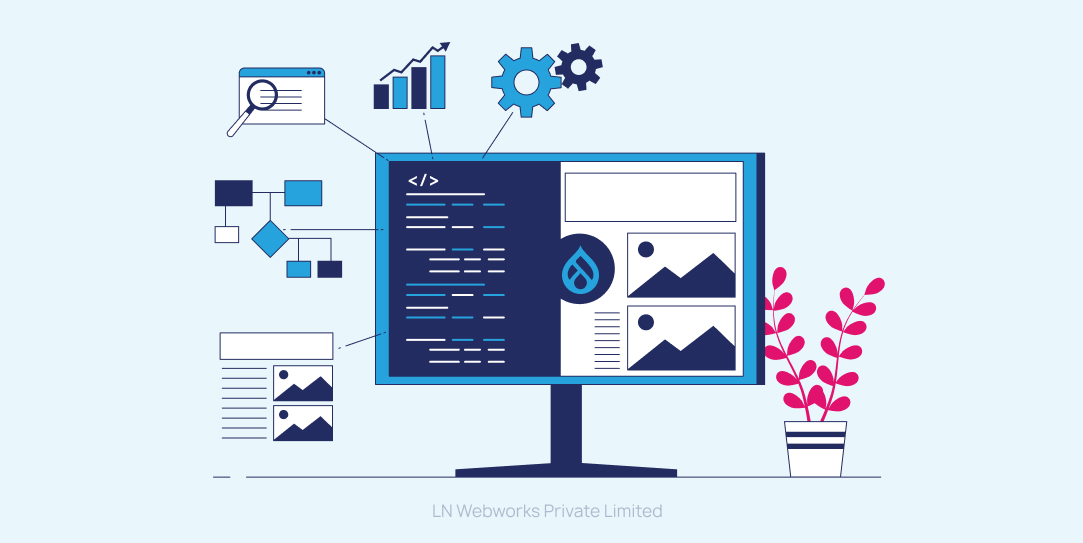Web Components: Benefits and Drawbacks You Need to Know

Today, web components play a pivotal role in Drupal development services. They are basically a suite of multitudinous technologies that empower you to generate reusable custom elements. The functionalities of these custom elements are encapsulated away from the rest of the code but you can utilize them in your web applications.
Due to their enormous benefits, web components have emerged as a preferred way for building web UI as they resolve numerous issues associated with web development. However, as with every other technology, they also have some associated drawbacks along with their tremendous benefits. This raises a pressing question, whether you should utilize web components in your Drupal project or not?
In this blog, we’ll examine the benefits and drawbacks of web components and help you make an informed decision.
6 Remarkable Benefits of Web Components
1. Seamless compatibility with a plethora of platforms
One of the major reasons why web components are so preferred everywhere including Drupal development services is that they are native to the browser. What this means is that you can effortlessly create a component and use it whenever required without worrying about compatibility issues with other platforms.
To be precise, theoretically, you can start using your custom tags as and when required without any compatibility issues. All in all, web components empower you to develop features that can work well across multiple platforms and applications.
2. Impeccable backward compatibility
Upgrading a web component is a hassle-free process. Web components render an effective encapsulation boundary that empowers your frontend user interface to keep running seamlessly alongside the new code. The incredible backward compatibility enables you to update any web component without disturbing previous instances of usage in your Drupal website.
So, you can change the internal logic of any of your web components without leading to any compatibility issues.
3. Implementation of a unified design system
By leveraging the power of web components you can establish phenomenal brand consistency. Pondering over how? The answer lies in the encapsulation of the styles of a particular component within it.
As the styles are safely enclosed within respective components, enforcing brand consistency throughout various platforms and technologies becomes a breeze with them.
4. No need for extra libraries
Initially, libraries such as React and Vue.js acted as pedestals for providing custom components to projects. However, with the development of web components, you no longer require those. You can still use them but they aren’t necessary anymore.
Besides, you can utilize frameworks like Lit to build and expand components to enhance developer experience, but they are also not necessarily required for using components.
5. Single functionalities enclosed within components
It is fascinating to note that components carry within them everything they require for proper functioning. This implies that you can set a particular code within a component and it will automatically perform the desired functions whenever required. For instance, you can utilize a web component to automatically push Google Analytics whenever an accordion is expanded by anyone. JavaScript and Styles can be enclosed within web components effortlessly.
6. Hassle-free piecemeal migration from Drupal 7
Drupal migration is usually considered a challenging task. If you are yet to avail of Drupal development services for migrating to a higher version, you can still build your web components in Drupal 7 without worrying about having to rebuild them after upgrading. This is because you can effortlessly transfer them to Drupal 10 or any other Drupal version you aspire to switch to. Isn’t it great news?
In light of all this information, we can unquestionably say that web components can render tremendous benefits when it comes to Drupal development services. However, what benefits you get to reap and what you don’t, will largely depend on how you utilize them. To elucidate a bit more, you can align your usage accordingly to make the most of the integral benefits of web components.
Now, after getting acquainted with the phenomenal advantages of web components, we must proceed toward the associated drawbacks.
The 3 Major Drawbacks of Web Components You Cannot Overlook
Advantages and disadvantages are two sides of the same coin. Every technology in existence has some disadvantages, and web components are no exception. So, without any further ado, let’s explore the 3 major downsides of web components.
1. A slowdown in the development process
Web components are among relatively new technologies. Hence, while working with them you may have to battle certain issues and upheavals. Even if you are well-versed with the technology, you cannot avoid them as getting acquainted with the basics of technology is way simpler than its practical execution.
However, it is all a part of growing and developing web components. Even as an experienced Drupal developer renowned for rendering exceptional Drupal development services, you may find it challenging to deal with web components which may slow the development process. Still, if you stay persistent, a day will come when you’ll unarguably emerge as a master of technology.
2. Performance issues
While working with web components, it is imperative for you to focus your energies on your content structure to ensure that thousands of DOM nodes don’t end up accidentally being rendered on a single page. Additionally, you should also beware of nesting components within components as it can worsen existing performance issues.
Another issue you need to be mindful of is that there is an increase in on-load JavaScript compilation and execution for every web component that is loaded on a page.
3. Required integration into your JavaScript build system
While working with web components, you’ll require a bundling system such as Webpack in order to ensure that you receive all your dependencies effortlessly. This won’t cause you any trouble in case you are already equipped with an extensive frontend build process.
However, if you don’t have one in place, you’ll have to work things out. You can go about writing web components that are independent of any external dependencies such as Vanilla JavaScript. This will help ensure that you don’t have any build-up steps and that things remain streamlined for you.
Let’s Wrap Up
Web components are playing an important role in the world of Drupal development services. However, deciding whether or not to use web components in your Drupal project can be tricky as they have both advantages and disadvantages associated with them. In this blog, we examined both the benefits and drawbacks of using web components in Drupal services. You can conclude whether to use web components for your project or not by analyzing if the benefits outweigh the drawbacks in the case of your Drupal project.
However, if you still face any confusion, you can reach out to LN Webworks, a reputed Drupal development company. Our eminent Drupal developers will help you decipher if web components will go well with your Drupal project or not. So, remember to contact us in times of need.
